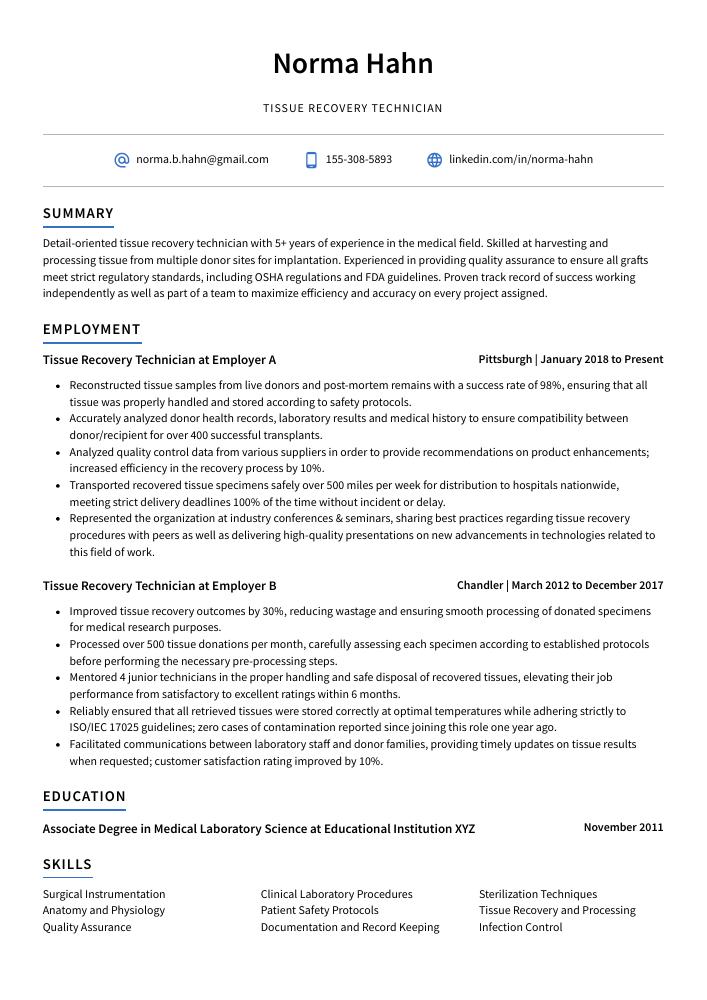Tissue Recovery Technician Resume Guide
Tissue Recovery Technicians collect, process and distribute donated tissue for use in transplantation or medical research. They assess donor suitability, recover tissues from donors according to established protocols and ensure that tissue specimens are accurately labeled before distribution. Additionally, these technicians also provide support to family members of the deceased as they navigate through the donation process.
You have the technical expertise to work as a tissue recovery technician, but hiring managers don’t know about your qualifications. To get their attention and land the job you want, it’s essential that you write an eye-catching resume.
This guide will walk you through the entire process of creating a top-notch resume. We first show you a complete example and then break down what each resume section should look like.
Table of Contents
The guide is divided into sections for your convenience. You can read it from beginning to end or use the table of contents below to jump to a specific part.
Tissue Recovery Technician Resume Sample
Norma Hahn
Tissue Recovery Technician
norma.b.hahn@gmail.com
155-308-5893
linkedin.com/in/norma-hahn
Summary
Detail-oriented tissue recovery technician with 5+ years of experience in the medical field. Skilled at harvesting and processing tissue from multiple donor sites for implantation. Experienced in providing quality assurance to ensure all grafts meet strict regulatory standards, including OSHA regulations and FDA guidelines. Proven track record of success working independently as well as part of a team to maximize efficiency and accuracy on every project assigned.
Experience
Tissue Recovery Technician, Employer A
Pittsburgh, Jan 2018 – Present
- Reconstructed tissue samples from live donors and post-mortem remains with a success rate of 98%, ensuring that all tissue was properly handled and stored according to safety protocols.
- Accurately analyzed donor health records, laboratory results and medical history to ensure compatibility between donor/recipient for over 400 successful transplants.
- Analyzed quality control data from various suppliers in order to provide recommendations on product enhancements; increased efficiency in the recovery process by 10%.
- Transported recovered tissue specimens safely over 500 miles per week for distribution to hospitals nationwide, meeting strict delivery deadlines 100% of the time without incident or delay.
- Represented the organization at industry conferences & seminars, sharing best practices regarding tissue recovery procedures with peers as well as delivering high-quality presentations on new advancements in technologies related to this field of work.
Tissue Recovery Technician, Employer B
Chandler, Mar 2012 – Dec 2017
- Improved tissue recovery outcomes by 30%, reducing wastage and ensuring smooth processing of donated specimens for medical research purposes.
- Processed over 500 tissue donations per month, carefully assessing each specimen according to established protocols before performing the necessary pre-processing steps.
- Mentored 4 junior technicians in the proper handling and safe disposal of recovered tissues, elevating their job performance from satisfactory to excellent ratings within 6 months.
- Reliably ensured that all retrieved tissues were stored correctly at optimal temperatures while adhering strictly to ISO/IEC 17025 guidelines; zero cases of contamination reported since joining this role one year ago.
- Facilitated communications between laboratory staff and donor families, providing timely updates on tissue results when requested; customer satisfaction rating improved by 10%.
Skills
- Surgical Instrumentation
- Clinical Laboratory Procedures
- Sterilization Techniques
- Anatomy and Physiology
- Patient Safety Protocols
- Tissue Recovery and Processing
- Quality Assurance
- Documentation and Record Keeping
- Infection Control
Education
Associate Degree in Medical Laboratory Science
Educational Institution XYZ
Nov 2011
Certifications
Tissue Recovery Technician Certification
American Association of Tissue Banks
May 2017
1. Summary / Objective
The summary/objective at the top of your resume should provide a snapshot of who you are and why you excel as a tissue recovery technician. This is where you can highlight your key skills, such as experience in operating medical equipment, knowledge of sterile techniques, and ability to work with donors’ families during difficult times. You could also mention any certifications or awards that demonstrate your commitment to excellence in this field.
Below are some resume summary examples:
Diligent and detail-oriented tissue recovery technician with 5+ years of experience in the medical industry. Committed to providing quality care and support for those who have donated their tissues, organs, or bodies for medical research. Skilled at adhering to procedures while maintaining a professional attitude in high-pressure situations. Seeking to join ABC Medical Center as a Tissue Recovery Technician and use my skillset to help improve patient outcomes.
Amicable tissue recovery technician with a passion for helping others. Experienced in all aspects of the tissue donation process, from donor consent to tissue collection and processing. My experience includes working with an interdisciplinary team of professionals at XYZ Hospital to facilitate over 100 successful donations per year. Committed to providing compassionate care while ensuring compliance with applicable regulations and standards.
Dependable tissue recovery technician with 6+ years of experience in donor tissues and organs. Skilled at processing tissue/organ donations while adhering to all ethical, legal, and regulatory standards. At XYZ Medical Center successfully procured over 50 organ/tissue donations for transplantation procedures since 2019. Received company “Outstanding Employee” award for consistently exceeding performance expectations by 15%.
Well-rounded tissue recovery technician with 7+ years of experience in the medical field. Experienced in recovering, processing and preserving donor tissue for transplantation or research purposes. Proven track record of following safety protocols to ensure accuracy and precision at all times. Seeking to join ABC as a Tissue Recovery Technician to help bring comfort and healing to patients’ lives through my work.
Seasoned tissue recovery technician with 8+ years of experience in the field. At XYZ, conducted and managed tissue donor recoveries while ensuring compliance to all applicable regulations and laws. Received awards for recovering a record number of donors within budget constraints. Experienced in communicating effectively and compassionately with families of potential donors during sensitive situations.
Driven and knowledgeable tissue recovery technician with 5+ years of experience providing support to donors, families, and medical staff in the procurement process. Seeking a role at ABC to use recovered organs for transplantation purposes and help save lives through efficient retrieval procedures. Key achievements include recovering 56% more heart valves than average during my tenure at XYZ Hospital.
Accomplished tissue recovery technician with 3+ years of experience in a fast-paced hospital setting. Skilled at handling tissue and organs for transplantation, processing them to meet clinical needs, and providing quality assurance while adhering to strict regulations. Looking to join ABC Hospital as the next Tissue Recovery Technician and provide top-notch service that meets or exceeds expectations.
Proficient tissue recovery technician with 3+ years of experience working in a clinical environment. Seeking to join ABC Medical Center, where I can leverage my knowledge and skills to help save lives through the donation process. In previous roles, improved post-recovery tissue quality by 25% and exceeded donor consent rate goals by 15%.
2. Experience / Employment
The employment (or experience) section is where you provide details on your work history. It should be written in reverse chronological order, which means that the most recent job is listed first.
When writing this section, use bullet points to make it easier for the reader to take in what you have to say quickly and easily. You want each point to explain what you did and any results or accomplishments achieved as a result of your efforts.
For example, instead of saying “Recovered tissue samples,” you could say, “Successfully recovered over 500 tissue samples from donor bodies per week using specialized tools.”
To write effective bullet points, begin with a strong verb or adverb. Industry specific verbs to use are:
- Collected
- Processed
- Assessed
- Preserved
- Dissected
- Documented
- Sterilized
- Packaged
- Transported
- Monitored
- Inspected
- Reconstructed
- Reconciled
- Analyzed
- Disposed
Other general verbs you can use are:
- Achieved
- Advised
- Compiled
- Coordinated
- Demonstrated
- Developed
- Expedited
- Facilitated
- Formulated
- Improved
- Introduced
- Mentored
- Optimized
- Participated
- Prepared
- Presented
- Reduced
- Reorganized
- Represented
- Revised
- Spearheaded
- Streamlined
- Structured
- Utilized
Below are some example bullet points:
- Formulated and implemented new tissue recovery processes that improved operational efficiency by 25%, leading to a reduction of 5 hours per day in tissue processing time.
- Introduced and successfully trained 8 staff members on all donor eligibility criteria, resulting in an increase of over 50% in the number of qualified donors during the past 2 years.
- Substantially reduced laboratory costs through careful management and monitoring of inventory levels, achieving savings totaling $20,000 annually.
- Preserved harvested tissues following strict protocol guidelines while maintaining high quality control standards at all times; consistently achieved 99% success rate for recipient grafts/transplants from recovered tissuessince starting role 3 years ago.
- Developed relationships with multiple donor organizations to bring awareness about tissue donation opportunities; recruited more than 40 potential donors within 1 year alone.
- Inspected and recovered post-operative tissues from surgical instruments, ensuring that all required pathology specimens were collected according to hospital protocols; cut costs by 25% through improved efficiency of tissue recovery processes.
- Dissected and isolated human tissue samples with precision and accuracy in order to identify irregularities or abnormalities; increased laboratory specimen quality by 10%.
- Independently prepared donor sites for harvesting organs or tissues during surgery, processing more than 30 cases per month without error.
- Revised the existing protocol for sterilizing equipment used in organ/tissue transplants, reducing time spent on each procedure by 15 minutes on average while maintaining safety standards across all operations conducted at the facility.
- Packaged sterilely harvested organs/tissues for transport after surgeries, adhering strictly to regulatory guidelines and ensuring proper preservation before delivery within a timely manner (+50% faster turnaround rate).
- Competently collected and processed tissue donations from over 30 donors each month, disposing of unused specimens in a safe manner to prevent any contamination.
- Disposed of unusable human tissue samples according to FDA regulations and conducted regular inventories on all equipment used for recovery processes; reduced wastage by 25%.
- Participated in monthly training sessions directed towards new recruits as well as existing staff members to ensure that everyone was up-to-date with the latest policies and procedures pertaining to tissue collection & donation activities.
- Assessed donor suitability prior to harvesting tissues, ensuring compliance with regulatory standards; lowered rejection rate of unsuitable donors by 10%.
- Structured an efficient workflow system for managing patient care documentation which streamlined the entire process and saved 15 hours per week on administrative tasks.
- Actively monitored and managed the tissue recovery process for over 700 donated organs a year, ensuring that all safety protocols were strictly followed.
- Coordinated with multiple medical teams to secure necessary donor organ supply and guarantee timely transport of recovered tissues; reduced wait time from donors by 20%.
- Spearheaded an organizational initiative to standardize tissue collection procedures across 5+ hospitals in the region, resulting in a 10% increase in successful transplants each month.
- Reduced contamination levels during storage and shipping operations through proper handling techniques, special packaging materials and temperature monitoring equipment; improved quality assurance ratings by 15%.
- Utilized advanced laboratory equipment such as microscopes & centrifuges to prepare specimens for further testing according to hospital guidelines & regulations set forth by governing bodies like FDA/CDC/WHO etc..
- Reorganized tissue sample storage system, reducing search time by 40% and improving documentation accuracy.
- Monitored tissue recovery operations to ensure all protocols were followed; identified errors quickly which resulted in a 10% reduction of waste disposal costs.
- Collected samples from various sources for further processing and testing, ensuring that contaminated materials were handled safely at all times; delivered over 1000 clean samples every month with 0 contamination incidents reported.
- Proficiently operated laboratory equipment such as microscopes, centrifuges, pipettes etc., to examine tissues & separate cells from other substances while adhering to safety regulations and quality standards.
- Compiled detailed reports summarizing the results of each experiment conducted within the lab environment including data analysis & interpretation findings; enabled expedited decision-making processes for senior management personnel resulting in improved efficiency across departments (+20%).
- Sterilized, organized and maintained surgical instruments, equipment and supplies for tissue recovery processes; decreased patient infection rates by 14%.
- Demonstrated proficiency in the collection of human allografts from deceased donors at organ procurement organizations (OPOs), ensuring that strict compliance with FDA regulations was met.
- Advised nursing staff on matters pertaining to therapeutic and diagnostic procedures related to donor tissues; improved communication between teams by 12%.
- Optimized tissue recovery techniques, increasing successful grafts per month by 30%; managed inventory levels across multiple OPO sites while reducing wastage costs by $1,500 annually.
- Successfully performed quality control checks on recovered tissues prior to their dispatchment to hospitals & other medical facilities; reduced processing time per sample from 4 hours down to 2 hours each day on average.
- Presented tissue samples to nurses and other medical staff on a daily basis, ensuring that all records were up-to-date with patient information.
- Meticulously tracked tissue inventory using data entry software, reconciling discrepancies between stock levels and actual usage; achieved 95% accuracy rate in the last quarter.
- Reconciled billing disputes for 30+ accounts per month by crosschecking documentation from both parties involved; reduced average resolution time by 25%.
- Achieved annual savings of $10K through efficient management of laboratory supplies such as needles, syringes, bandages and gloves while adhering strictly to safety protocols at all times.
- Streamlined tissue recovery processes by introducing new procedures for sorting & labeling specimens prior to disposal or archival storage; increased efficiency by 20%.
- Thoroughly cleaned, processed and sterilized over 500 tissue samples per day for transplantation purposes, resulting in a 15% increase in recovery rates.
- Expedited retrieval of donor tissues to meet tight deadlines; decreased turnaround time by an average of 3 hours every week.
- Documented all tissue activities according to regulatory standards with 100% accuracy; ensured proper storage and transport protocols were followed at all times.
- Prepared detailed reports on the condition of retrieved organs/tissues prior to usage; improved tracking processes which reduced misplacement incidents by 50%.
3. Skills
Skill requirements will differ from employer to employer – this can easily be determined via the job advert. Organization ABC might be looking for a tissue recovery technician with experience in the operating room, while Organization XYZ might require someone who has worked in an eye bank.
It is essential to tailor your skills section of your resume to each job that you are applying for because many employers use applicant tracking systems these days which scan resumes for certain keywords before passing them on to a human. That being said, it’s important not only list skills here but also discuss them further in other areas such as the summary or experience section.
In addition, some organizations may have specific requirements related to certifications and/or qualifications; make sure that if this applies you include those details here too!
Below is a list of common skills & terms:
- Anatomy and Physiology
- Clinical Laboratory Procedures
- Documentation and Record Keeping
- Infection Control
- Medical Terminology
- Patient Safety Protocols
- Quality Assurance
- Sterilization Techniques
- Surgical Instrumentation
- Tissue Recovery and Processing
4. Education
Mentioning an education section on your resume will depend on how far along you are in your career. If you just graduated and have no prior experience, include an education section below the resume objective. However, if you have extensive work experience as a tissue recovery technician with multiple responsibilities to showcase, omitting the education section is perfectly fine.
If including an education section, try to mention courses and subjects relevant to the tissue recovery technician role for which you are applying.
Associate Degree in Medical Laboratory Science
Educational Institution XYZ
Nov 2011
5. Certifications
Certifications demonstrate to a potential employer that you have the knowledge and skills necessary for the job. They are also an indication of your commitment to professional development, as they require dedication and hard work in order to obtain them.
When applying for jobs, make sure to include any certifications related to the position on your resume so employers can see how qualified you are. This will help give you an edge over other applicants who may not have such credentials.
Tissue Recovery Technician Certification
American Association of Tissue Banks
May 2017
6. Contact Info
Your name should be the first thing a reader sees when viewing your resume, so ensure its positioning is prominent. Your phone number should be written in the most commonly used format in your country/city/state, and your email address should be professional.
You can also choose to include a link to your LinkedIn profile, personal website, or other online platforms relevant to your industry.
Finally, name your resume file appropriately to help hiring managers; for Norma Hahn, this would be Norma-Hahn-resume.pdf or Norma-Hahn-resume.docx.
7. Cover Letter
A cover letter is a great way to make yourself stand out from the other job applicants. It is typically made up of 2-4 paragraphs and provides more detail about who you are, your qualifications, why you’re applying for the role and what value you would bring to the company.
Cover letters also provide an opportunity for recruiters or employers to gain insight into your personality as well as any special skills or experiences that may not be obvious on your resume alone. Even though they aren’t usually required by most jobs, writing one can greatly increase your chances of getting hired!
Below is an example cover letter:
Dear Rahul,
I am writing to apply for the Tissue Recovery Technician position at LifeSource. As a certified tissue recovery technician with experience in both hospital and community settings, I am confident that I would be a valuable asset to your organization.
In my current role as a tissue recovery technician at Mayo Clinic, I work closely with surgeons to recover tissue for transplantation. I have experience recovering all types of tissue, including heart, liver, kidney, and pancreas. In addition to my technical skills, I have excellent interpersonal skills and am able to build rapport with donors and their families. My ability to provide compassionate care while maintaining strict adherence to protocol has resulted in positive feedback from both donors and staff members.
I am passionate about helping others and saving lives through organ donation, which is why I would like to join the team at LifeSource. With my combination of technical expertise and people skills, I am confident that I can make a positive impact on your organization. Thank you for your time; I look forward to hearing from you soon.
Sincerely,
Norma
Tissue Recovery Technician Resume Templates
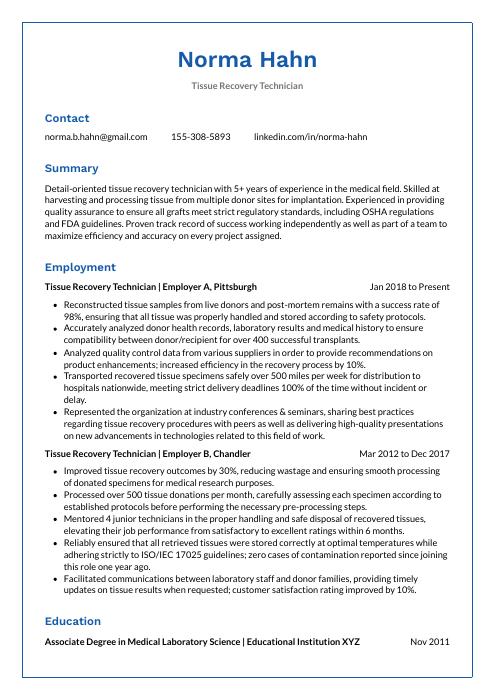 Markhor
Markhor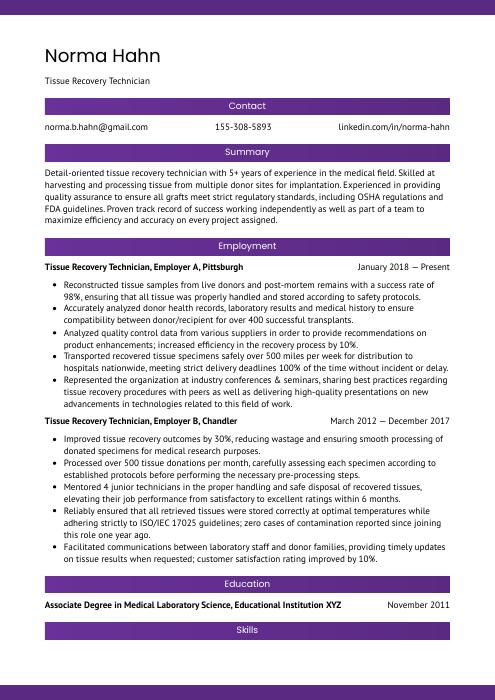 Jerboa
Jerboa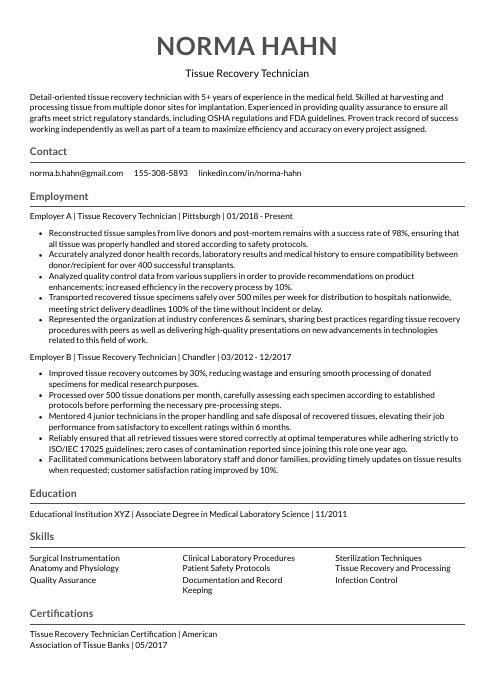 Indri
Indri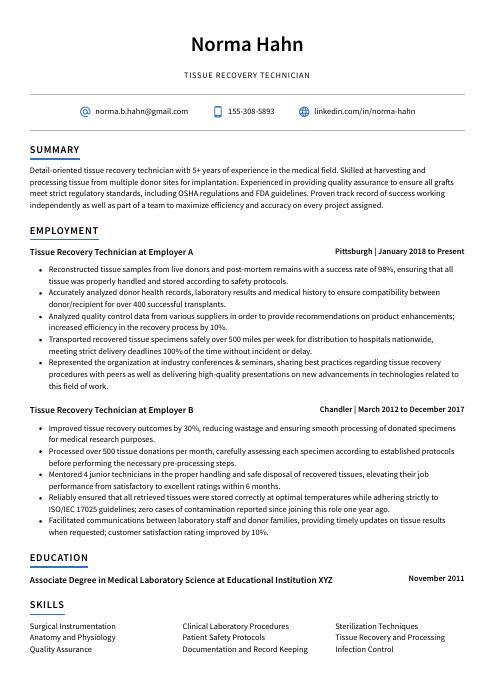 Axolotl
Axolotl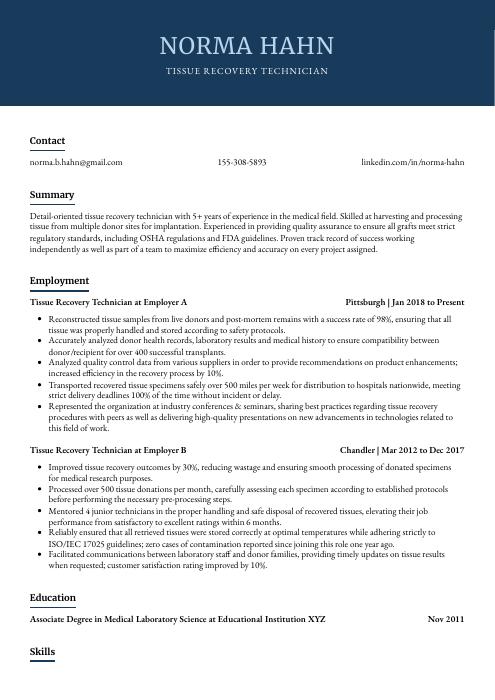 Bonobo
Bonobo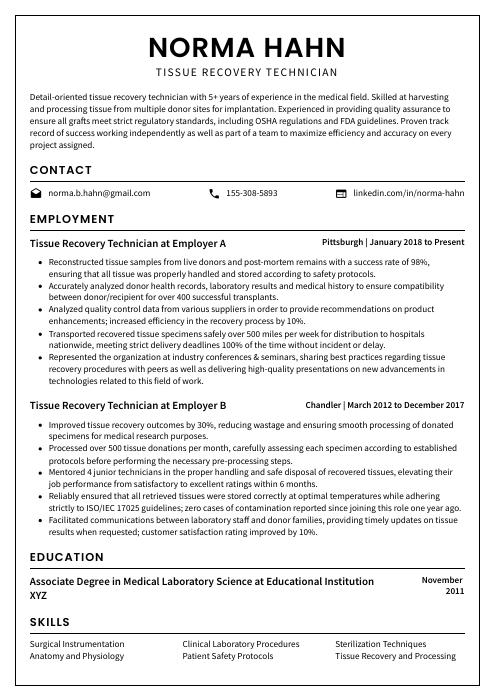 Cormorant
Cormorant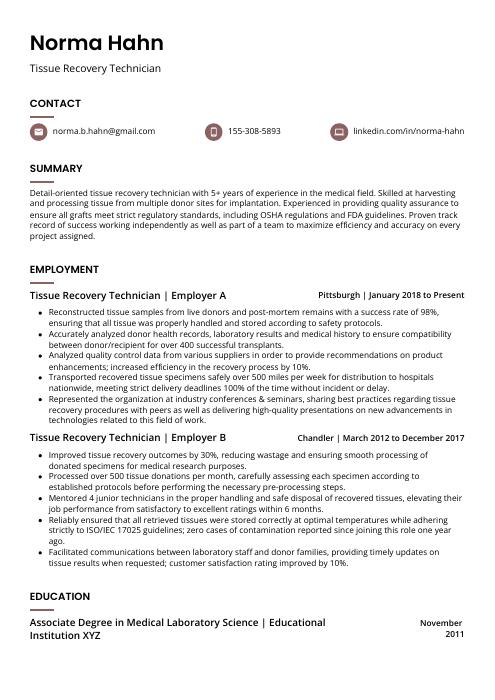 Fossa
Fossa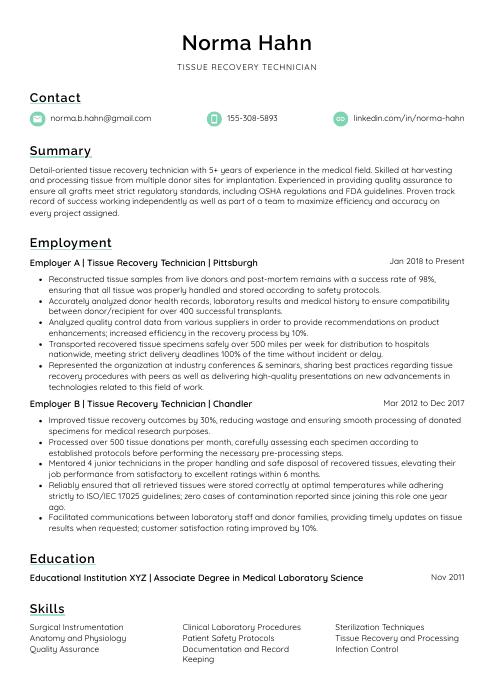 Lorikeet
Lorikeet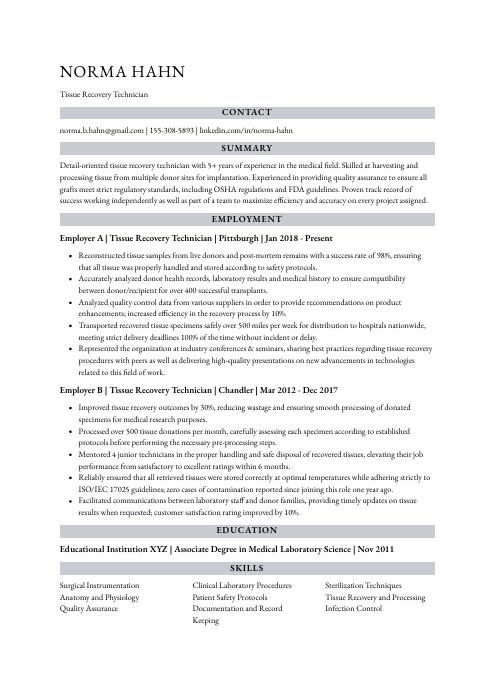 Numbat
Numbat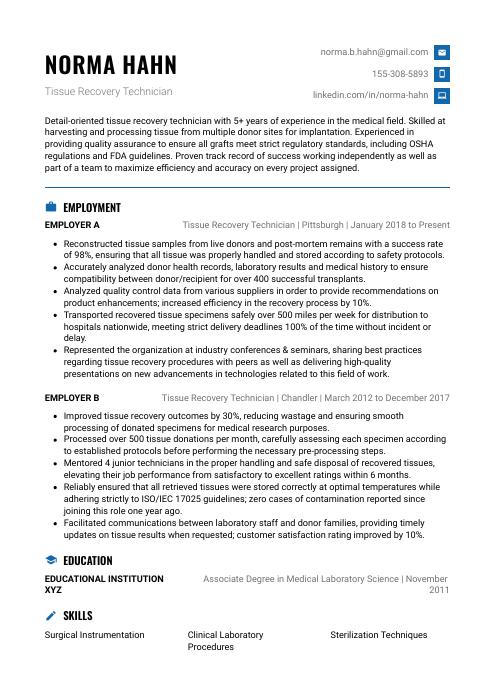 Echidna
Echidna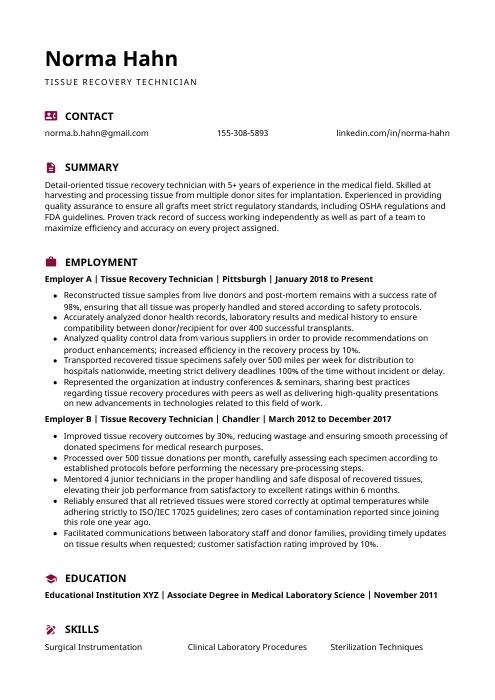 Hoopoe
Hoopoe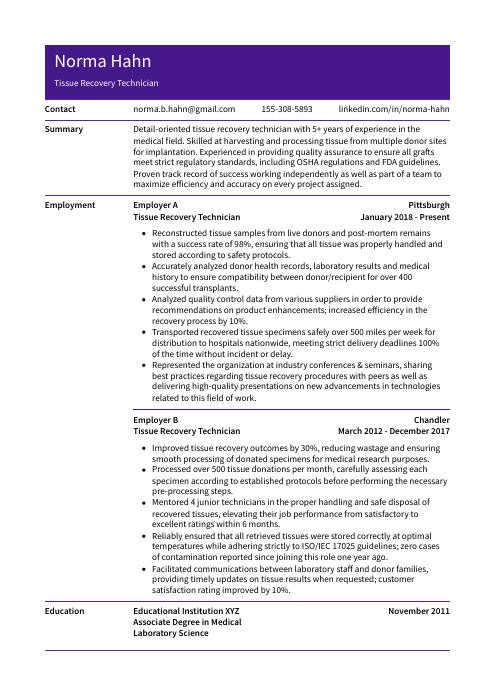 Pika
Pika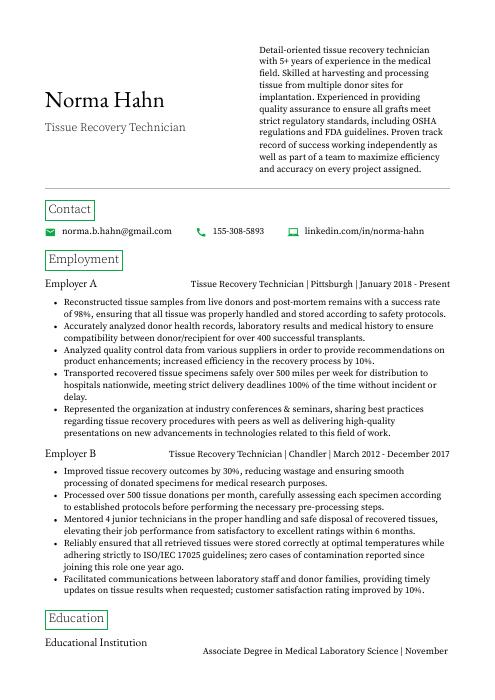 Quokka
Quokka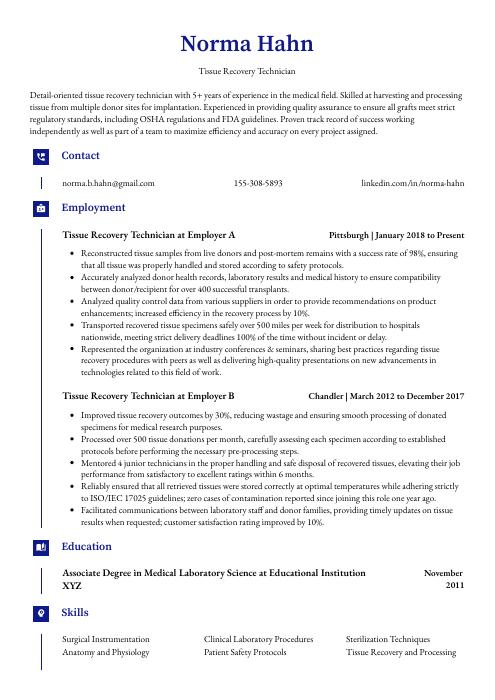 Gharial
Gharial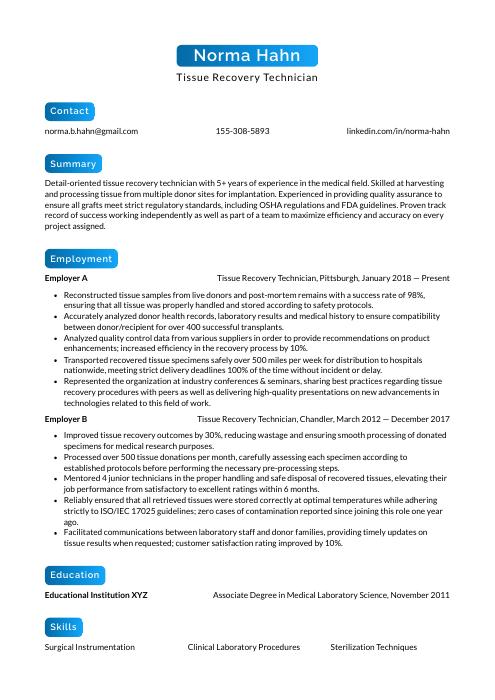 Kinkajou
Kinkajou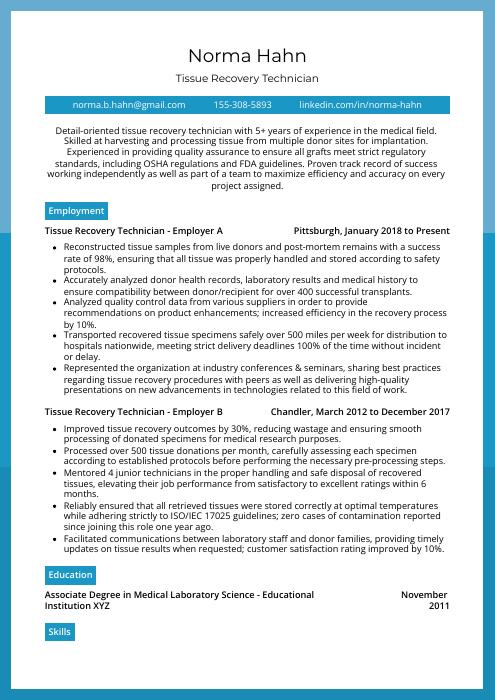 Rhea
Rhea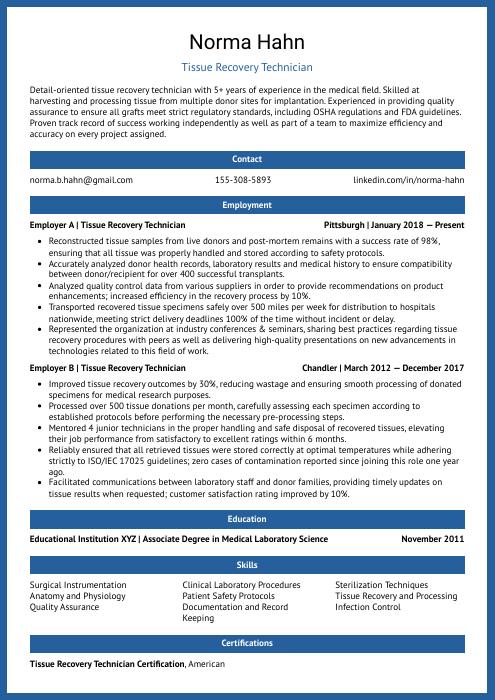 Ocelot
Ocelot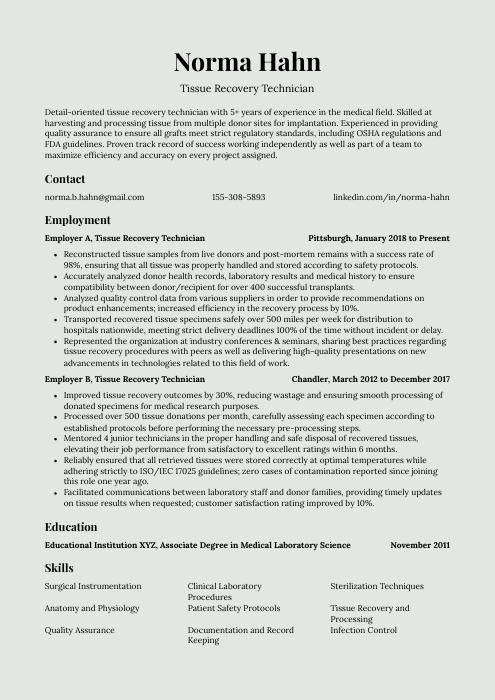 Saola
Saola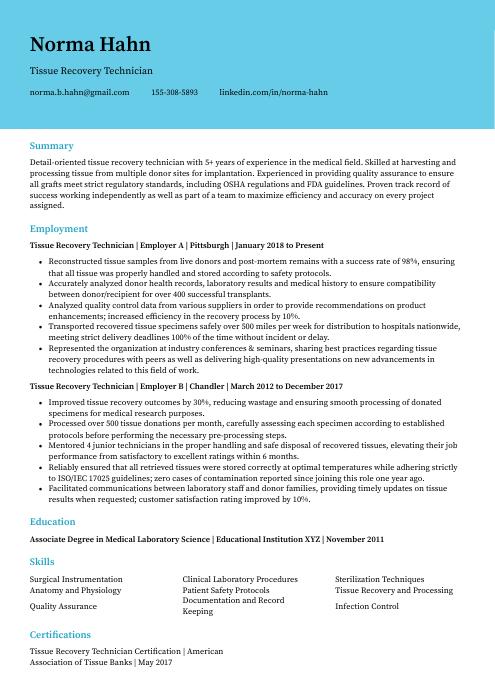 Dugong
Dugong Rezjumei
Rezjumei
